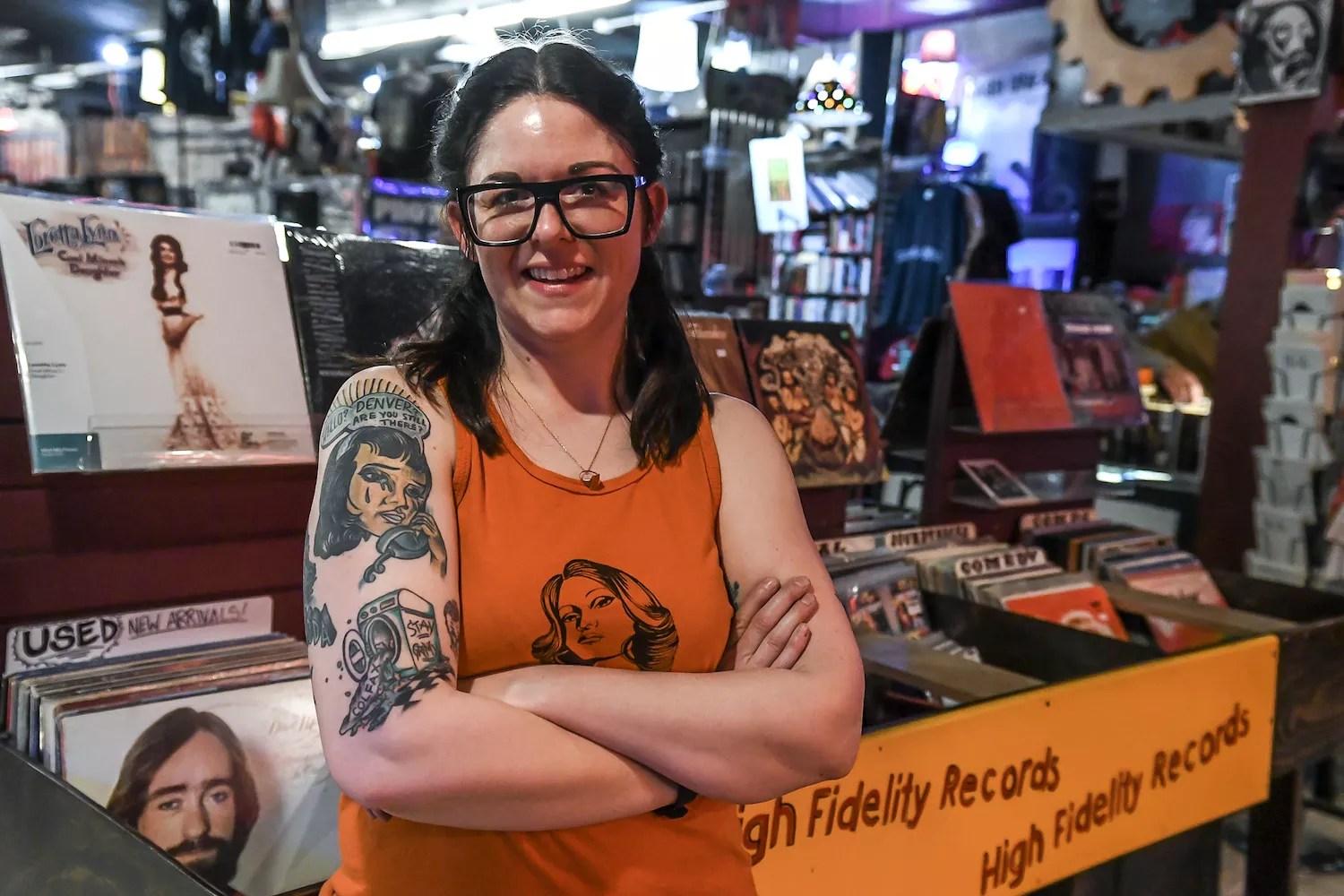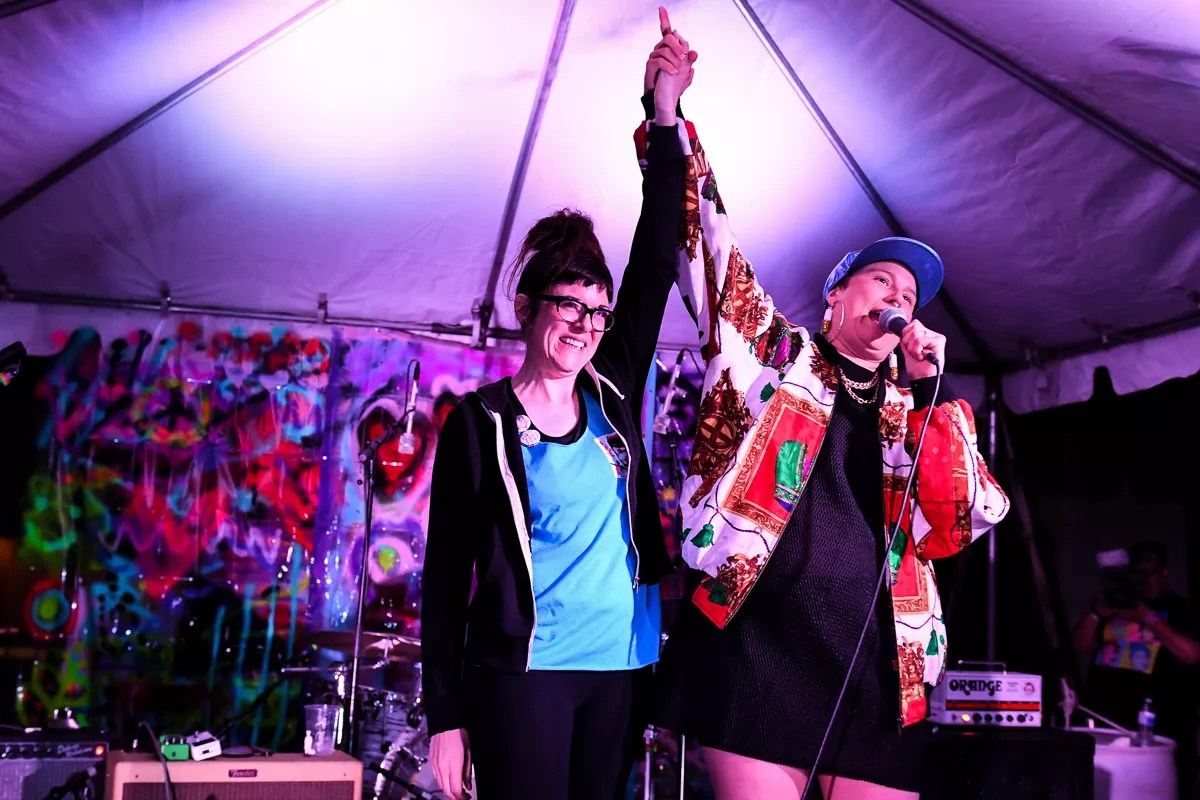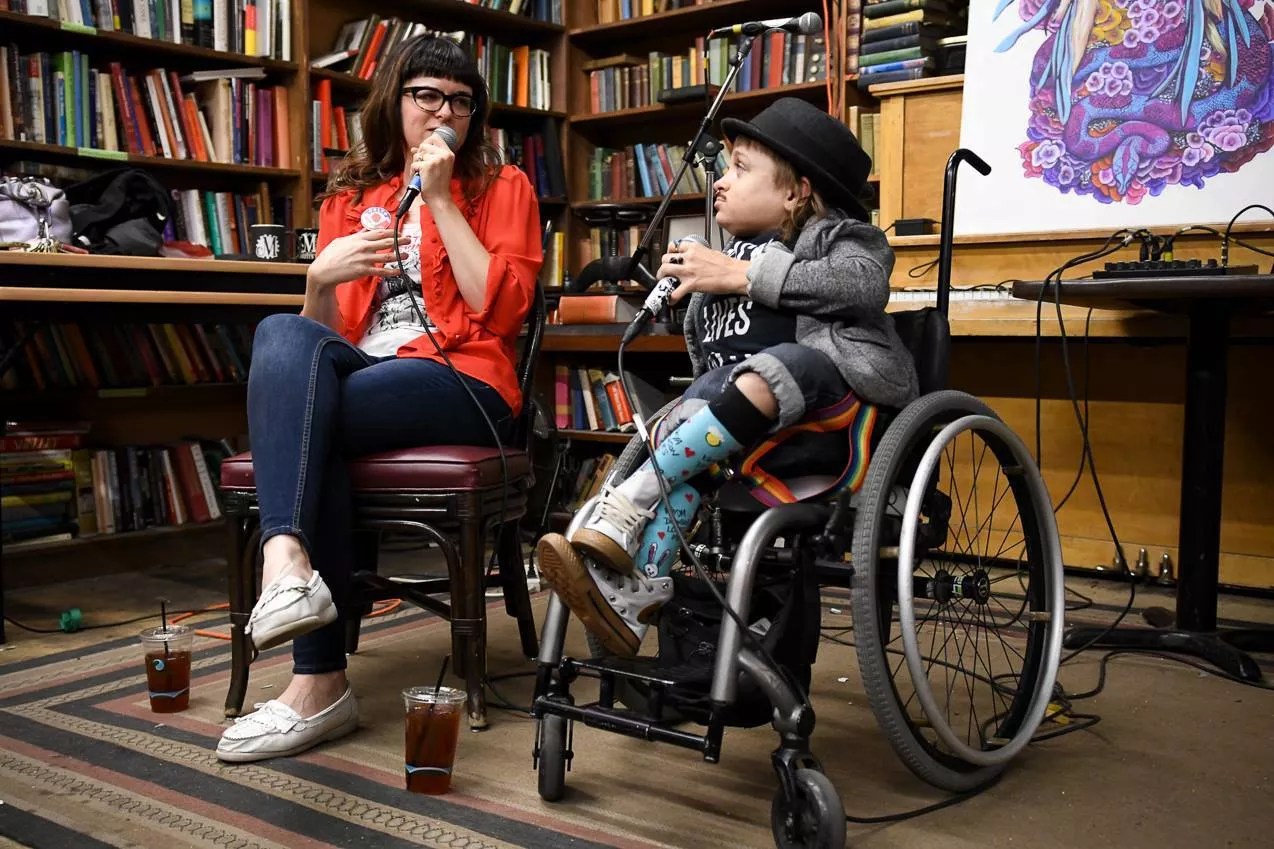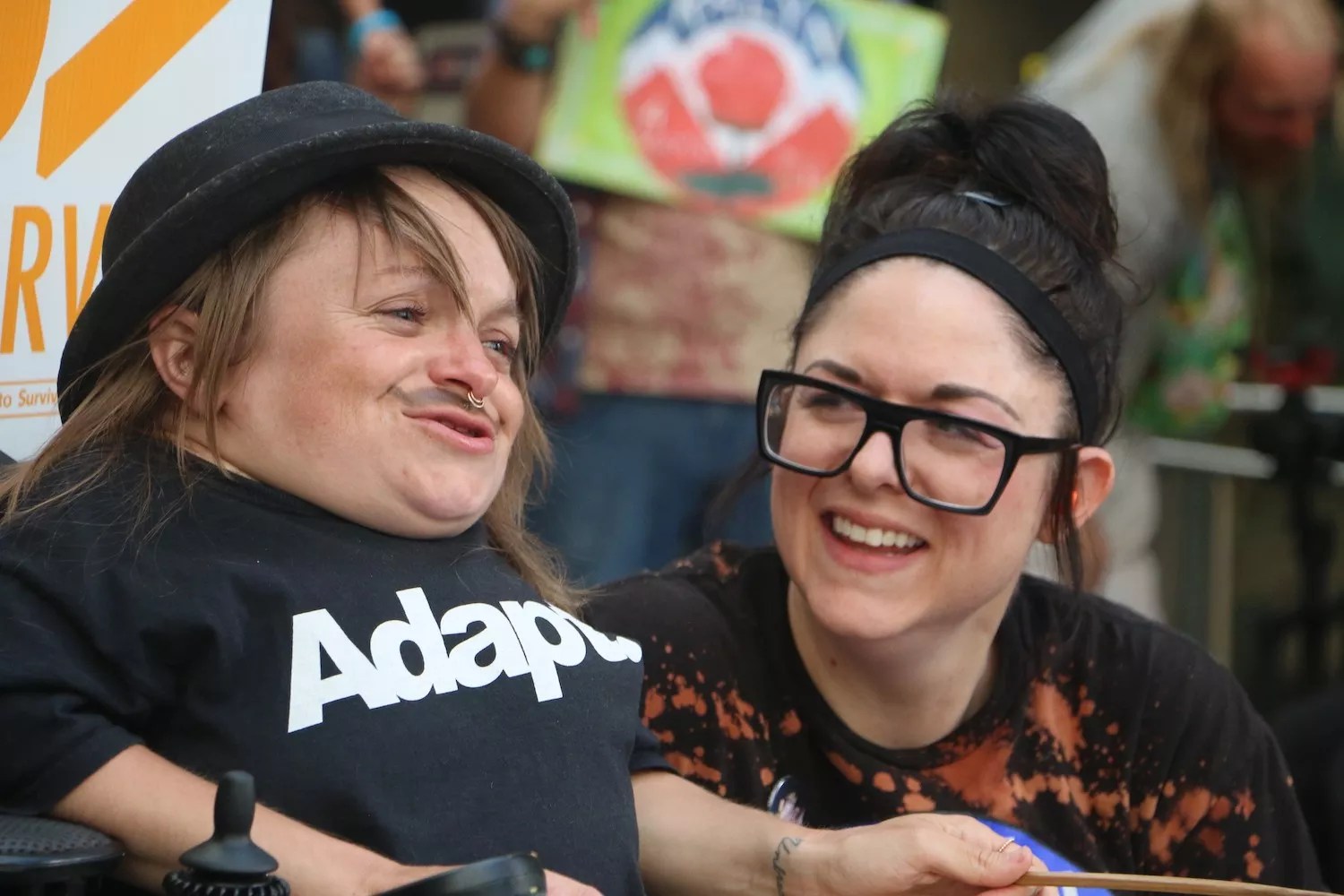
Veronica Lee

Audio By Carbonatix
When Bree Davies first spoke out as a Colorado Creative in 2015, she was already a rabble-rouser and friend to Denver’s struggling DIY and creative communities, as well as a journalist and Westword arts columnist. Since then, her goals as an activist have blown up into a way of life: She’s an urban planner, political organizer, podcaster and peoples’ advocate. Davies acknowledges that she’s still learning more every day about how the world works, and it doesn’t look like she’ll be shutting down that process anytime soon. Find out why as she revisits the Colorado Creatives questionnaire.

Bree Davies in the limelight at MCA Denver’s Fem Fest 2018.
Courtesy of MCA Denver
Westword: How has your creative life grown or suffered since you last answered the CC questionnaire?
Bree Davies: That’s a big question – I would say my creative life has changed more than anything. In addition to being an advocate for artists in the realms of getting paid, getting credit for their work and getting fair and adequate access to art-related opportunities that are now flowing into Denver with all of this new money, I have started working on advocating for affordable, accessible, attainable housing for all. And that move was directly related to my involvement with the arts world I call home.
After the Ghost Ship fire in Oakland in 2016, the global DIY community not only lost 36 people in a horrific tragedy, but we saw an abrupt end to that era of DIY. Underground, off-the-grid, under-the-radar venues, warehouses and the quote-unquote nontraditional living spaces where many artists were living, working and communing across the country were suddenly being exposed. With that unwanted attention came unwarranted mass evictions. In Denver, I watched eleven of my friends rendered homeless on one of the coldest nights of the year because of this – all while living in a supposed “arts district.” They lost their homes, we lost our community spaces. It was devastating. This was all happening at time when gentrification was – and still is – in visible full swing, meaning many of those evicted couldn’t find anywhere remotely affordable to live.
Along with this collective rejection of Denver’s DIY arts community, we were also seeing the embracing and propulsion of Meow Wolf as something the City of Denver was now interested in. I was watching my community simultaneously be commodified and evicted out of existence by similar forces. Denver felt like it was sending this weird message, like, we like DIY artists from other places with big ideas, but sorry, local DIY artists (who have been doing the exact same thing as Meow Wolf already), we aren’t interested in you being able to live here or have space here anymore. It was – and still is – a Twilight Zone experience.
In this same time frame, my friend Colin Ward died by suicide. It was devastating. It was one of the most profound losses I’ve ever experienced. I’ve never seen people I love – artists I admire – hurt so much, so publicly. Colin was our collective heart. He was also one of the artists evicted from Rhinoceropolis. I believe deeply that the loss of his home and his community space and the fact that he never found that same kind of place for secure housing and total freedom again made whatever else he was facing in his life worse. His death was one of the main reasons I knew I had to do more when it came to housing issues, particularly housing for artists.
So that’s how I ended up working in urban planning (which is what I do now, among a million other things). I wanted to un-fuck-up all of these ideas around public and private space, get to the root of how we could make housing a human right, and examine who does and doesn’t have access to shared public space. I wanted to learn how these systems of “urban” development worked from the inside, so I could change them and make them work for more people. I am lucky to have found a planning and development firm that hired me because of my outsider status. I am an artist in a planning world, and I get to challenge notions of what makes a city a city every day.

Davies hosts an episode of Sounds on 29th for CPT12.
CP@12
As a creative, what’s your vision for a more perfect Denver?
For starters, a really simple way to make Denver more perfect? Overturn the urban camping ban. I just came off of working on a mayoral campaign that asked a similar question of ourselves through every moment of the process: What can we do to make Denver more accessible, affordable, livable and, frankly, pleasurable right now?
My friend and comrade Kalyn Heffernan rolled for mayor of Denver because she believes that this city should be physically, economically and social accessible to everyone. I joined her campaign staff – called the Kitchen Cabinet, because we literally met in her apartment every week – because I still believe Denver is a place for people of all economic backgrounds. But the current administration – and what is shaping up to look like the next four years of an administration – doesn’t support the idea of an economically diverse Denver.
I learned so much in the last year as her campaign’s Press Sorceress. I learned how money played into politics in ways I could not imagine. It is more disgusting and calculated than we think. Money changes everything, from your access to participating in debates to how much you are considered “viable” as a candidate. I was also deeply moved by what I learned in our campaign’s support of the (sadly failed) Right to Survive, Initiative 300; I shared meals and conversation with my neighbors experiencing homelessness, and it opened my eyes to the privilege I have just by being a housed person.
I-300 failed because a $2.4 million campaign run by lobbyists scared folks into believing homelessness is not only a choice, but a fault and a consequence of people not being “good” humans. It was a campaign built on lies and funded by the very entities in this city that should be coming up with ways to house our people. A growing unhoused community means Denver isn’t moving up in the world; it means we’re moving away from ever being the “great” city this administration’s PR machine has sold to folks outside of Denver.
What would make Denver more perfect for me as a creative are the same things that would make Denver more perfect for everyone: secure, affordable, accessible housing for everyone, to start. We cannot take care of ourselves and meet our basic needs if we do not have a secure, accessible, affordable space to live, rest, commune and thrive. Artists are part of every community.
Contrary to the narrative that landowners and certain politicians want you to believe, artists are not the first wave of gentrification. Gentrification comes from governments that work in conjunction with landowners, real estate developers, contractors, construction companies and big business to force a city into the shape, complexion and income-tax bracket it sees as “most desirable.”

Davies interviews her friend and mayoral candidate Kalyn Heffernan for Hello? Denver? Are You Still There? at Mutiny Cafe.
Veronica Lee
It’s a challenging time for artists and creatives in the metro area, who are being priced out of the city by gentrification and rising rents. What should they do about it, short of leaving?
Oh, wow. There are so many things artists – and anyone! – can do to fight gentrification. If you have the privilege to leave on your own terms, before you do that, examine why you want to leave, why you have the capability to leave by choice and what you could possibly do instead if you were to stay and fight.
I was just in Albuquerque over the weekend and was able to share a meal with a group of artists I’ve known for ten years. We discussed what Denver was going through and what they were seeing coming for their own city in the next few years. Because they are economically in an opposite place to Denver, they are hearing from fellow artists in gentrifying cities this idea of wanting to move and “take over Albuquerque” because it is “so affordable.”
That’s colonizer shit. We don’t need history to keep repeating itself; as artists, we can creatively strategize ways to make our cities better for everyone. We cannot think that leaving and moving into a new city is the answer, especially if leaving means contributing negatively to, or putting an undue burden on, a community in another place.
If you are able to stay – or able to have the choice to stay – in Denver, figure out how you can work collectively with your neighbors to build stronger connections. Gentrification seeks to divide us; it is a manifestation of capitalism. If we talk to each other, share meals with each other and share our own resources with each other, our communities become stronger. We can cut through the bullshit scare tactics of gentrification and get to the root of what our neighbors and rooted communities need in terms of support and, if they request it, advocacy.

Dr. Gregory Diggs and Tony Pigford guest on Hello? Denver? Are You Still There?.
Veronica Lee
If you can buy land or collectively buy land, do it. I had the privilege (in part through familial support) to buy a house with my fiancé last year; I fully understand the privilege of being able to do this, and I do not take it lightly or for granted. I work daily on ways to support my neighbors and my community in the things that are important for the place I live. I didn’t buy a house in the neighborhood I’ve called home for a decade because I wanted to change the ‘hood. The idea of buying land that was stolen in the first place is something I struggled with. But I had to realize that if I didn’t do it, someone else would. And maybe that someone else doesn’t care about the west side the way that I do.
Other ways artists can fight gentrification? Take that developer money. If they are going to pay you to “do graffiti” in or on a building you can’t afford to live in, charge them triple what you usually charge. Don’t let anyone think that because they have commodified art that they can also depoliticize it – or you.
On that note, don’t be afraid to “get” political. Many of our comrades in this world don’t have a choice but to “be” political; in all of the work I’ve done with the disabled community over the last few years, I have learned so much about what it means to exist in a body that is simultaneously ignored, trivialized and politicized. Politics can be sexy, it can be artful, it can be creative. Politics, like most things, could use more creativity. I learned that from watching Kalyn. Get out there with your art and yourself.
One last thing: As artists, we must stay critical. You can take that grant money, take that Meow Wolf money, take that developer money, take all of it. But don’t ever stop being critical of the systems and mechanisms that want a piece of your art. Your art is your choice; it’s whatever you want it to be. Let your art be your bread; let it be your weapon; let it be your voice; let it be whatever you want it to be. Just never stop asking questions, and never stop critiquing the motives of people who commodify art. Art is forever going to be commodified – just don’t let that commodification shut you up or make you compromise yourself.

Kalyn Heffernan and Bree Davies share a moment on the 2019 Kalyn4mayor campaign trail.
Kyle Harris
What’s your dream project?
I have to say, I live it every day. I’ve been able to collaborate with people I think are incredible. I dream projects up, and cool humans help me execute them; I also get to support rad people in executing their own dreams, and that is all I could ask for.
If I had a dream, though, it would be to be featured on one of those billboards for MSU Denver, because it may have taken me eight years to get a BA in journalism, but I earned that shit way back when our little city college was still called Metro State. Besides, I think if I was able to get my face on a billboard, my mom would finally take my work seriously, haha.
What advice would you give a young hopeful in your field?
Support other peoples’ work and events. Show up for others. Be the person in the crowd at the show or the opening or the performance you hope to see at your own events. When people ask me, “How can I be a part of making Denver better?” or “How can I not be part of the problem (of gentrification)?” or “How can I get people to come to my shows?” I say this: Show up. Movements don’t happen if people don’t show up. Art doesn’t make change if people don’t support it. If you don’t build community around the work that you do by being there for others, how can you expect others to be there for you?
Also: young, old, whatever, challenge yourself in who you collaborate with. If you only collaborate with people who are the same age as you, or have the same physical abilities, or are from the same economic background as you, stop doing that. It makes for boring art. Like, if every band you’ve ever been in has only been with other able-bodied, straight white dudes with similar life experiences, your music will reflect that. Some of the best work comes from the spaces where we are uncomfortable – whether that is art work, social justice work, community work, personal work, etc. It deserves to be challenged. Challenge what you think you know. You’ll make better art, I promise.

Bree Davies with fellow community mover and shaker Ru Johnson.
Michael McGrath
Who is your favorite Colorado Creative?
I can’t choose! I work with so many incredible people in this city. Follow me on Twitter. I post about artists I love every day. (And this isn’t a ploy to get to you to look at the trash fire of Twitter; I just work with so many amazing artists, activists, politicians, organizers, librarians and leaders on a daily basis, and I try to share their work through the avenue of trashy old Twitter.)
What’s on your agenda right now and in the coming year?
This weekend, on Saturday, May 18, you can catch Fem Fest 2019 at MCA Denver! I produce this festival annually in conjunction with the museum. It’s a chance for me to showcase the community of artists I work with on a regular basis; it’s also a chance for folks who maybe don’t know much or haven’t had much experience with our “local” scene to be fully immersed in music, visual art, workshops, performances and so much more. It’s all-ages, meaning babies to grandmas are welcome. It is an accessible space! It is a place to put your money where your mouth is and support artists at every stage of the game.
I also host a live monthly podcast called Hello? Denver? Are You Still There? at Mutiny Information Cafe. It is free, accessible, all-ages, all welcome. The idea is to get folks in a room, face-to-face and off the Internet, to talk about issues impacting Denver. I like to facilitate conversation between people who aren’t always invited to the same tables; I like to see what ideas we can come up with to make Denver a better place by hearing different perspectives. I like to introduce people to other people. It’s my thing. Come to a podcast recording and you might meet your soulmate. I’m just saying!
Sounds on 29th, the show I host for CPT12, is filming its eighth season this summer! I’m stoked to introduce viewers to dozens of musicians I admire, along with several collections of music videos from local artists. It is one of my most favorite “jobs” I’ve ever had: I get to work for public television, which I think is so crucial to not only the arts, but to our democracy and to our experiences in the place we call home.
I also get to work under the continued mentorship of my friend and teacher Heather Dalton. She, like me, was born and raised in Denver, and we share an affinity for our city and our arts and music communities. We both have a strong drive to tell stories and share wonderful things about the people, communities and neighborhoods that make up Denver, and I’m lucky to get to work with her in the realm of public television, a service to the greater good that I truly believe in.

Kalyn Heffernan and Bree Davies share a moment on the 2019 Kalyn4mayor campaign trail.
Kyle Harris
Who do you think will (or should) get noticed in the local creative community in the coming year?
This is just a short list of people doing incredible things in Denver (there are so many I know I’m forgetting!): Innervisions Collective, Jae Mo, Sheree Brown, Elle Naef, Veronica Lee, Kenzi Everitt, Bulldozer Boy, Moe Gram, Selecta C and, of course, my longtime homegirl Karma Leigh (who has always been doing crucial work as an artist and educator, but will be teaching painting classes at the soon-to-be-open new Gypsy House location!). Oh, and Su Teatro. Please, check out Su Teatro. It is the living, breathing history and continuation of Denver’s story as a city.
I also want to give a shout out to Rosehouse, Hope Tank, Mutiny Information Cafe and all of the other independently owned, community-centered shops on South Broadway and across the city that are fighting the fight alongside residents to keep Denver beautifully weird, accessible and open to all. Businesses willing to take chances on supporting community through political action and holding space in a gentrifying city like Denver are something rare. Supporting them along with supporting artists is what is going to keep this city’s soul intact, as we collectively survive things like elections, real estate booms and busts, gentrification and cultural erasure and other factors that press hard on humanity every day.
Attend Fem Fest from 10 a.m. to 8 p.m. Saturday, May 18, at MCA Denver, 1485 Delgany Street; base admission is $2 to $8, with added fees for workshops, tarot readings and comedy. Buy tickets and chart the course of your day at eventbrite.com.
Keep up with news about and episodes of Mutiny Information Cafe’s Hello? Denver? Are You Still There? podcast with host Bree Davies at Mutiny’s website.
Follow CPT12’s Sounds on 29th online, and follow Bree Davies on Twitter, Facebook and Instagram.